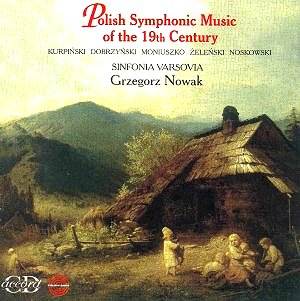To chase the nay-sayers
from the temple CD Accord has recorded
this anthology of 19th century Polish
symphonic music. If your taste runs
to Rossini-Mendelssohn-Schumann with
a nationalist 'dusting' then you must
get this disc.
Kurpinski's
Rossini-like overture with its silky
lyrical premonitions of Weber has Beethovenian
accents (Coriolan and Egmont).
Dobrzynski's even more Weberian
overture starts in shadows with very
individual woodwind solos curling away
in the bass until a warm yet tense theme
enters at 1.34. A helter-skelter slaloming
slide brings the festivities to a close.
The overture by Moniuszko shows
dramatic stage-craft coupled with the
pathos of Mendelssohn (Fair Melusine,
Calm Sea and Prosperous Voyage and
Ruy Blas) and of Fuchs. Of all
the Moniuszko overtures only Bajka
(subtitled A Winter's Tale - so
perhaps inspired by the Shakespeare
play) is a free-standing concert work.
Even then Moniuszko at 7.20 introduces
a bel canto aria (minus voice
of course) perhaps similar to one from
his own operas such as Halka or
Straszny Dwor (The Haunted
Manor) - both recorded - or from
Hrabina, Verbum Nobile or
Paria). Zelenski, founder
of the music conservatory in Cracow,
although writing within the Schumann-Mendelssohn
perimeter, introduced new elements.
For example in his In the Tatras
the writing for woodwind has
a pastoral folksy thematic twist and
there are Tchaikovskian moments (4.43)
too. It is too early to pick out the
Nietzschean or existentialist high hills
sympathies of Novak, Delius, Szymanowski
or Karlowicz but music's movement in
that direction can be heard even if
the packaging is strongly 19th century.
Noskowski's three symphonies
(1875, 1879, 1903) should be recorded.
His tone poem The Steppe looks
towards Russian models such as Borodin
and Balakirev using the grand apparatus
of the late romantic orchestra in subtlety
of colour but coupled with a melodic
invention that can best be compared
with Arensky and Liapunov and, at 5.03,
even Rachmaninov. The cleansing emptiness
of the steppe is suggested but we also
encounter the chivalric exploits of
the wasteland's horse-rider nobility.
As with the other pieces this is despatched
with panache and imagination by a conductor
I had not previously encountered on
disc. The playing of the orchestra is
well up to the best who the case of
many of its players might well have
been meeting these works for the first
time.
Had this collection
been issued by Hyperion, music-lovers
outside Poland would have been snapping
this up in hundreds. Don't let this
collection slip past.
Rob Barnett

![]() for
details
for
details